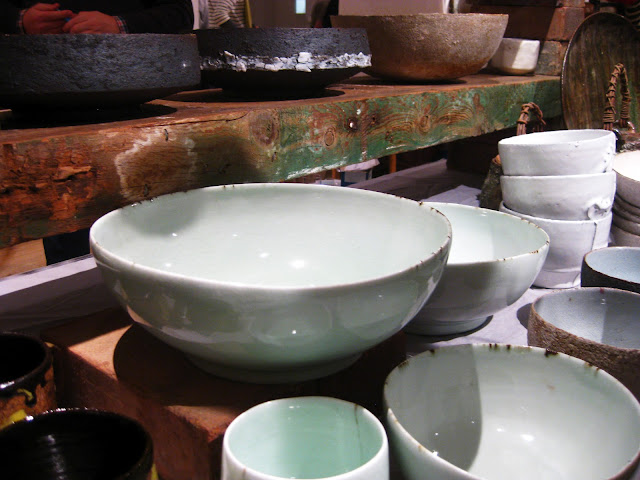As my passion grew for ceramics and
pottery, I decided to go to the Ceramics Fair that is being held at
the Geffrye museum, as part of the London Design Festival, and will
run until the 23rd of september. The museum set up a space
in the lower ground floor of the building for 45 UK based artists to
showcase and sell their work. I thought this would be a good chance
to learn more about firing and glazing techniques. I was right: I put
absolutely no effort in hiding that I know nothing about ceramics and
all the potters I talked to were very keen to explain me the process
behind their works. There were a few artists I especially enjoyed
talking to.
The first artist I had the pleasure to
talk to was Anja Lubach. Her portfolio includes mostly porcelain
pieces, and I was attracted to her stall by the distinctiveness of
her style. Anja teaches ceramics at the Greenwich Community College,
and she mostly works with porcelain. Her pieces are incredibly
meticulous, and I can only imagine the patience it must have taken to
achieve such results. The way she tastefully balanced the focal point
of her vessels and bowls, with the blank spaces is also remarkable.
She had no rush and took her time to answer my questions and tell me
about the technique she used. Talking with her I learned a lot about
the basics of working with porcelain. She also gave me some
suggestions on where to start to work with clay.
After walking around a little more, I
had a chat with Helen Rondell, from Kent. Her style moulded around
her travels in the US and the collection she was showcasing at the
fair was inspired by native wedding vases. Her pieces, mostly
vessels, are characterised by smooth opaque surfaces and neutral
colours that resemble sea polished pebbles. I was really fascinated
by the pattern she achieved on the surface of the vases. The organic
shapes lead the eye along undisturbed, giving a beautiful sense of
harmony. She kindly explained me more about the glazing and firing
process she used to produce her pieces, that is a variation of the
raku technique. I also really liked her business cards: the
consistency of the paper reminds me of her vases, which is a very
clever touch.
Before leaving I spent a good 20
minutes talking with Akiko Hirai, which was quite lucky as she was
often busy with other visitors. She is based in London and teaches at
Kingston University. Her pieces are characterised by rough surfaces,
earthy finishes (which she achieved through the reduction process)
and irregular shapes: all these features work attractively together
in creating pieces that are stony yet graceful. I also really liked
the purposely rudimental style she adopted to display her collection.
She will be showcasing her work at the Oxford Ceramics Fair too,
on the 27th and 28th of October.
Below are some more pictures from around the fair.
This is some of Daniel Boyle's work, who explained me the technique of throwing salt on the pottery pieces when it is at its highest temperature to achieve the effect that you see above.
Lovely work, and lovely person, too.
Visiting the fair cleared out some
doubts I had, but what I enjoyed the most was hearing all the artist
talking so passionately about their work, their experience and their
background. Knowing how they learnt, where and what inspired them was
probably more useful to me than learning about the technique itself.
I would like to thank all the artists that took some of their time to
talk to me.

















0 comments:
Post a Comment